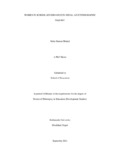
Please use this identifier to cite or link to this item:
https://hdl.handle.net/20.500.14301/292| Title: | WOMEN IN SCHOOL GOVERNANCE IN NEPAL: AN ETHNOGRAPHIC INQUIRY |
| Authors: | Dhakal, Rebat Kumar |
| Citation: | Dhakal,R.K,(2021).Women in school governance in Nepal: An ethnographic inquiry . |
| Issue Date: | Sep-2021 |
| Publisher: | School of Education |
| School: | SOED |
| Department: | DODE |
| Level: | Ph.D. |
| Program: | PhD in Development Education |
| Abstract: | As Nepali society is largely men-dominated, women are under-represented in all public fronts, including politics, bureaucracy and institutional management. Nevertheless, efforts are made towards promoting women’s participation in the governance of public institutions. In this study, I take the question of how the formal structures at an institutional level are (dis)empowering school stakeholders and (dis/en)couraging participation of women in school governance. As such, I explore the understanding and practices of inclusive school governance, especially from the perspective of women participation, in a rural Nepali community school. Applying the theoretical lenses of participation, representation, critical mass and feminist standpoint, I examine the dynamics of including and othering in the School Management Committee (SMC) by unfolding the perceptions of SMC membersthemselves. The field materials are drawn from over 18 months of intensive ethnographic fieldwork, dominated by kurakani with the SMC members, conducted between 2016 and 2018 in a rural community school in Gandaki Province. Moreover, the participant engaged meaning-making process was applied to co-construct the meanings, and then the key insights are further discussed in light of some literature and theoretical lenses. The study reveals that the idea of women inclusion is contestable, and participants’ beliefs ranged from conformist to transitional to utopian. Yet, their situatedness can be mapped largely at the transitional level. It further explores the driving forces that brought certain women to the SMC. Besides the policy reform, which required more women to be in the SMC compared to the past, family interest and support, community people’s encouragement, sense of belonging and sustaining legacy, and acceptance culture also drove women to the SMC. The study further reveals that women SMC members’ seeming ignorance of school affairs and strong trust in the Headteacher/Chair limited them from participating fully and made them feel ‘othered’, ‘alienated’ and ‘excluded’. However, gradually, with the passage of time and learning, they felt somehow ‘included’ as their voices were also heard and interests were served. Therefore, the agenda of inclusion has not only given women SMC members a chance to represent women but also to drive girl-friendly initiatives, which otherwise might be neglected. |
| URI: | https://hdl.handle.net/20.500.14301/292 |
| Appears in Collections: | Theses |
Files in This Item:
| File | Description | Size | Format | |
|---|---|---|---|---|
| Rebat@PhD Thesis_Ethnography.pdf | 2.02 MB | Adobe PDF |  View/Open |
Items in DSpace are protected by copyright, with all rights reserved, unless otherwise indicated.